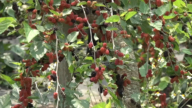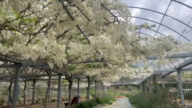【新唐人2014年03月22日訊】台灣學生反對《海峽兩岸服務貿易協議》,佔領立法院的行動,仍在繼續。這項攸關台灣64項服務業、上千種行業、近300萬人生計的貿易協定,雙方權益是否對等公平﹖有超過70%的台灣受訪民眾表示﹕不信任。而台灣國民黨立法院黨團這次在國會以強度關山的方式,30秒內宣佈通過「服貿」議案,所引起的這場「學運」,該如何收場﹖全球媒體都在關注。
包括英國廣播公司(BBC)、美國有線電視新聞網(CNN)、《華盛頓郵報》、《紐約時報》、以及《日本經濟新聞》、卡達半島電視臺等媒體網站,這兩天都以專題、專欄的方式或不小的篇幅,報導台灣民眾關心的「反服貿」議題。
這場被稱為「太陽花學運」的「反政府黑箱行動」,21號晚間仍在繼續,約有4萬人在臺北立法院周圍靜坐。
佔據國會議場的學生,希望政府在21號中午做出回應,而總統馬英九領導的執政團隊,在學生最後通牒時間過去之後,一直沒有應對動作,學生代表於是在21號下午6點召開記者會,宣佈﹕將擴大抗爭。
22號是週六假期,台灣中、南部民眾已經醞釀北上,加入這場抗爭活動。
新疆網友張海濤﹕「我覺得就像北京的89年一樣,學生們都嚮往民主自由的輿情,不想讓台灣的經濟被大陸綁架。」
英國廣播公司(BBC)報導,台灣人民心中始終有一種深層的恐懼,就是﹕北京當局企圖以商圍政,最後併吞台灣。隨著兩岸交流日益頻繁、關係愈來愈密切,這種恐懼愈來愈加深,不信任感愈來愈強。
湖北武漢人權活動家秦永敏﹕「台灣民眾非常擔心大陸會從經濟上控制台灣,從政治上滲透,慢慢的,更不要說民主制度發生倒退。」
台灣駐美代表金溥聰, 25號將接掌台灣國安會秘書長職位。他20號回台灣前,在美國機場向媒體表示,美國社會絕不會容忍,像台灣學生「反服貿」這樣的「暴力」行為。台灣政府是否強力清場﹖成為關注焦點。
湖北武漢人權活動家秦永敏認為,台灣目前是在中共所謂的「大中華」環境底下生存發展,台灣民眾這種抵抗行為,是台灣民主發展的可悲之處。
秦永敏﹕「在當局的重大政策違反民意的時候,人民能夠奮起表達不同意見,甚至能夠通過佔領立法院的形式,來表達訴求,這是台灣民眾他們非常成熟的表現。」
秦永敏表示﹕「羨慕」台灣民眾成熟的民主意識。
而原大陸《河北人民廣播電臺》編輯朱欣欣表示,中國的民眾是沒有發言權的,大陸民眾對台灣寄予很大希望,希望台灣成為中國大陸的民主典範,也希望台灣的民主運動能理性進行。但仍要注意中共的統戰伎倆。
原《河北人民廣播電臺》編輯朱欣欣﹕「應當警惕政客出賣我們台灣的利益,要警惕大陸通過經濟、文化手段,對台灣進行滲透,直接或間接的控制台灣的政治,因為中共邪惡的力量,它很狡猾的,千萬不要懷著願望去和大陸中共進行交往,一定要保持自己基本的底線,堅持自己基本的原則。」
有網友提出﹕台灣學生佔領立法院,意在質疑國民黨政府與大陸的服務貿易協議的程序不正義,而台灣國民黨政府急於與大陸簽署這個協議,也說明世界對中共的綏靖潮流。中共希望全世界都願意犧牲本國的資源、環境、和人民的幸福,來換取對它合法性的認可。
山東大學退休教授孫文廣 ﹕「比較起來的話,台灣的這個現狀,我們感到中國差距越大了。你現在就是到廣場去,你要舉一個牌子,要求官員公布財產,都要把你抓到監獄。民眾應該有充分表達的自由權利,集會這種自由都寫在憲法裡的,或者講人權保障也是。」
台灣學生佔領議會,引起了國際的關注。
日本影音網站「NICONICO LIVE」現場轉播台灣學生佔領立法院景象,吸引了超過80萬人點閱。日本也有網友自製影片,解釋台灣學生「反服貿」的原因,以及「服貿協議」帶來的影響。
與「服貿」相關的關鍵字,最近也成為了網絡熱搜詞。
採訪/陳漢 編輯/周平 後製/孫寧
How Will Taiwan’s Sunflower Student Movement End?
The Taiwanese student protest continues in
the Legislative Yuan assembly hall, against
the Cross-Strait Service Trade Agreement.
The agreement, known to involve 64 service
industries and thousands of businesses, will
effect the livelihoods of nearly 3 million people.
Is this trade a fair deal for Taiwan?
A recent poll suggests 70% say no.
Taiwan’s ruling Kuomintang, or KMT, forcibly
passed the Agreement at a congress meeting.
It was done within 30 seconds
of announcing the motion.
This action triggered the student movement. How will
the movement end? International media are watching.
Protests over the Cross-Strait trade pact have been
widely reported by BBC, CNN, Washington Post,
New York Times, Japan Economic Times, and Al Jazeera.
This ‘Sunflower Student Movement’ is protesting against
the ‘black box processes’ of the KMT government.
The sit-in continued on March 21 with 40,000
people occupying in the Legislative Yuan in Taipei.
Students had hoped a response by noon of March 21
from President Ma Ying-jeou, but there was none.
The students declared to the
press that the protest will expand.
As the weekend is approaching, people in Southern
Taiwan are organizing trips to join the protests in Taipei.
Zhang Haitao, netizen in Xinjiang:
“I feel it is like the Beijing in 1989.
These students are yearning for democracy and
freedom of public opinion, and don’t want to see
Taiwan’s economy being hijacked by the mainland."
BBC Chinese reported that the people in
Taiwan have always had a deep-seated fear.
Beijing authorities have attempted to
annex Taiwan through it’s economy.
With increasingly frequent and close cross-strait
exchanges, fear and distrust has increased too.
Qin Yongmin, Wuhan human rights activist: “Taiwanese
people are very worried about mainlaind China controlling
and infiltrating the economics and politics of their country.
This is not to mention the regression of their democracy."
King Pu-tsung, Taiwan’s chief representative
to the US, will become Taiwan’s National
Security Council Secretary General on March 25.
On his way back to Taiwan on March 20, he told media at
the U.S. airport that American society will not tolerate
‘violent’ behavior like the Taiwanese students in the protest.
It has now become a concern that the Taiwanese
government will conduct forceful removal of protestors.
Wuhan human rights activist Qin Yongmin
indicates that it is marks a sad moment for Taiwan.
That is, the need to engage in protecting democracy
in Taiwan in such manner, because of facing the
threat from the Chinese Communist Party.
Qin Yongmin: “When a major policy violates public opinion,
the people can rise up and express different opinions.
Even if this is in the form of occupation of the
Legislative Yuan, in order to express their demands.
The people of Taiwan are clearly
demonstrating their sense of maturity."
Qin Yongmin expresses his admiration for the mature
democratic consciousness of Taiwanese people.
Zhu Xinxin, a former editor of Hebei People’s Radio Zhu
warns, that the Chinese people have no freedom of speech.
However, they have great hope for
Taiwan’s progress in democracy.
The CCP’s united front tactics are what the
Taiwanese people ought to watch out for.
Zhu Xinxin, former editor of Hebei People’s
Radio: “We should be wary of politicians
betraying the interests of Taiwan.
We should be alert to infiltration and various controlling
of Taiwan’s politics through economic and cultural means.
Watch out for the cunning and evil CCP. Don’t hold
onto any hope to interact with the Communist Party.
Taiwan must hold on to its bottom line
and insist on the basic principles."
Netizens pointed out that the Taiwanese
students’ occupying the Legislative Yuan was them
questioning the trade agreement with the mainland.
The students think that this process
bypassed any democratic progress.
However, the KMT government’s anxiety to quickly
sign the agreement also reveals the wider international
trend of appeasing the Chinese Communist Party.
The CCP wants the world to willingly sacrifice their
own resources, environment, and well-being’s of citizens.
This is done in exchange for
recognition of the CCP’s legitimacy.
Sun Wenguang, retired Professor from Shandong
University: “Taiwan’s situation is in sharp contrast to China.
Whoever openly demands Chinese officials
to declare their property will be arrested.
People deserve the freedom and
rights to fully express themselves.
The freedom of assembly and human
rights were all written in the constitution."
Taiwanese students’ occupying their governments
building has attracted international attention.
A live video broadcast of the sit-in in the
Legislature by Japanese video site Niconico
Live has drawn more than 800,000 viewers.
There are also homemade videos from Japanese netizens
explaining the reason why the students are protesting.
Relevant keywords about the Trade Agreement
have also become popular on the internet.
Interview/Chen Han Edit/Zhou Ping Post-Production/Sun Ning


























